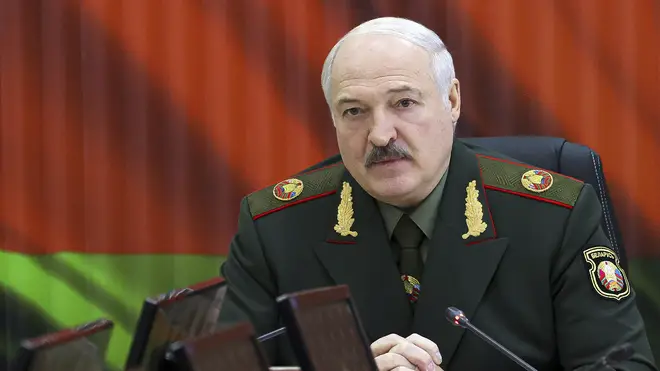
Ben Kentish 10pm - 1am
30 November 2021, 19:24

Alexander Lukashenko has also said for the first time that he recognises the contested Crimean Peninsula as part of Russia.
The President of Belarus has said that his country would be ready to host Russian nuclear weapons if Nato moves US atomic bombs from Germany to eastern Europe.
In an interview, Alexander Lukashenko also said for the first time that he recognises the Crimean Peninsula as part of Russia and plans to visit it soon. Russia annexed Crimea from Ukraine in 2014, a move that the west regards as illegal.
President Lukashenko made the remarks as he moves to cement ties with Russia, his main ally and sponsor, amid tensions with the west over his disputed re-election last year and a crackdown on dissent in Belarus.
Asked about the possible redeployment of US atomic bombs to eastern Europe if Germany’s new government were no longer willing to house the weapons, he responded that he would invite Russian President Vladimir Putin to send nuclear weapons back to Belarus that were withdrawn after the 1991 Soviet collapse.
“I would offer Putin to return nuclear weapons to Belarus,” President Lukashenko said in the interview with Dmitry Kiselyov, the head of Russian state media group Rossiya Segodnya.
The Belarusian leader would not elaborate on what kind of weapons Belarus would be willing to accommodate, saying that it would host those that would be “the most efficient”. He added that Belarus had carefully preserved the necessary military infrastructure dating back to the Soviet era.
Opposition leader Sviatlana Tsikhanouskaya, who left Belarus under pressure after unsuccessfully trying to unseat President Lukashenko in last year’s election, denounced his comments.
“Such a person shouldn’t be trusted to handle matches, let alone nuclear weapons,” she told The Associated Press.
Ms Tsikhanouskaya said the deployment of Russian nuclear weapons to Belarus would violate international arms agreements and the will of Belarus’s people. “The majority of Belarusians have spoken for Belarus’s neutrality,” she said.
Speaking earlier this month, Nato’s secretary general, Jens Stoltenberg, said the western military alliance would need to ponder redeploying nuclear weapons east if the new German government changed the country’s policy on nuclear sharing.
“Germany can, of course, decide whether there will be nuclear weapons in your country, but the alternative is that we easily end up with nuclear weapons in other countries in Europe, also to the east of Germany,” Mr Stoltenberg said.
Alexei Arbatov, a Moscow-based foreign policy expert, described the possible redeployment of US atomic bombs to eastern Europe as a “mad, adventurist move”. If Moscow responds by sending its nuclear weapons to Belarus, “the situation would be more dangerous than it was during the Cold War times,” the Interfax news agency quoted Mr Arbatov as saying.

Tensions have escalated since the summer over the arrival of thousands of migrants and refugees on Belarus’s border with EU member Poland.
The European Union has accused President Lukashenko of using desperate asylum-seekers as pawns and tricking them into trying to enter Poland, Lithuania and Latvia to destabilise the EU.
Belarusian authorities have denied the accusations and accused the EU of failing to offer safe passage to migrants and refugees. Since November 8, a large group of people, mostly Iraqi Kurds, has been stranded in Belarus at a border crossing with Poland.
Most of the the people stuck in freezing temperatures are fleeing conflict or hopelessness at home, and aim to reach Germany or other western European countries.
Ukrainian and western authorities have raised concerns in recent days about alleged Kremlin plans to invade Ukraine. President Lukashenko warned that his country would stand squarely behind Russia if the Ukrainian government launched an offensive against Moscow-backed rebels in eastern Ukraine.